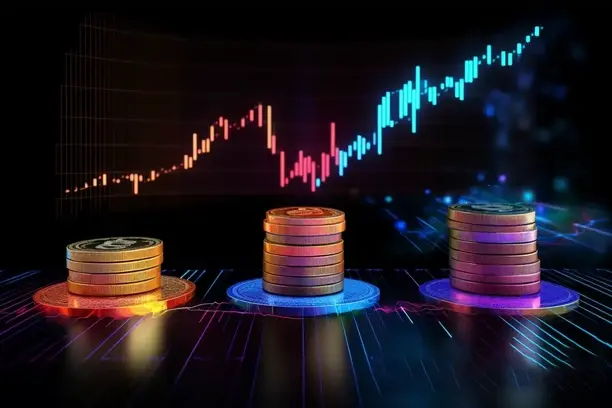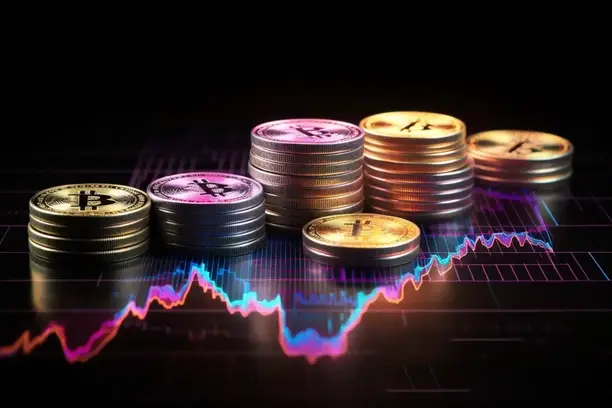Whether or not gold rises when Bitcoin plunges has become a hotly debated topic in the market. Investors often think that Bitcoin and gold are two very different assets, but is there a correlation between their price movements? This post will analyze the relationship between Bitcoin and gold from the perspective of market correlation and explore how the price of gold is affected in the face of volatile Bitcoin prices. By analyzing historical data and market trends, we will reveal the correlation mechanism between the two and help investors make more informed decisions in asset allocation.

Bitcoin vs. Gold: Asset Class Differences
Before analyzing the market relationship between Bitcoin and gold in depth, it is essential to understand their respective attributes. Bitcoin, as a cryptocurrency, has a high degree of volatility and a strong speculative nature in the market, while gold is seen as a traditional safe-haven asset that is usually favored in times of economic uncertainty or market turmoil. Both have different reasons and contexts for price fluctuations, yet they can move similarly under certain circumstances.
Bitcoin Characteristics and Market Impact
Bitcoin's price fluctuations are often influenced by a variety of factors, including market sentiment, regulatory policy, and technical factors. In recent years, Bitcoin has gradually transformed from a purely speculative asset into a class of digital gold investment vehicles, attracting the attention of more and more traditional investors. Bitcoin's price is still heavily influenced by investor psychology and is not easy to predict.
- High volatility: Bitcoin's price fluctuates widely and is susceptible to direct changes in market sentiment.
- Market Drivers: Unlike traditional assets, Bitcoin is heavily influenced by various emerging technologies, blockchain developments and global regulatory policies.
Characteristics and market impact of gold
Gold has long been recognized globally as a safe-haven asset, and its demand usually increases dramatically in times of recession, inflation or financial crisis. Gold's more stable price and lower volatility have made it the asset of choice for many long-term investors and reserve funds.
- Risk aversion properties: Gold typically performs better in times of global economic uncertainty and is widely used to combat inflation and market turmoil.
- Stable: Compared to Bitcoin, gold has less price volatility, making it more suitable for preserving value and long-term investment.
Bitcoin and Gold Correlation Analysis
Bitcoin and gold being two different assets, their correlation in terms of price volatility is not a simple direct relationship. While both may fluctuate in the same direction in certain market scenarios, their market influences and movements differ significantly in the long run. We will analyze the relationship between them in terms of several key factors.
The Impact of Macroeconomic Factors on Bitcoin and Gold
Macroeconomic changes usually have an impact on the prices of bitcoin and gold. For example, in times of global economic instability, investors may choose gold as a safe-haven asset, while in times of greater confidence in Bitcoin, investors may turn to the digital currency space. In particular, gold often performs well in macroeconomic contexts such as Fed interest rate hikes and rising inflation, while Bitcoin may experience sharp fluctuations due to market sentiment swings.
- Rate hike cycle: when the Fed raises rates, the dollar strengthens and gold and bitcoin usually face selling pressure.
- Inflation: In times of hyperinflation, the demand for gold as a safe-haven increases, and the concept of Bitcoin as "digital gold" may also attract investors.
Gold's Reaction When Bitcoin Plunges
Gold does not always move higher when the price of Bitcoin falls sharply. Price changes in both are largely influenced by market sentiment and capital flows. During a Bitcoin selloff, some investors may choose to exit the crypto market and shift their funds to more stable assets such as gold, driving up the price of gold. It is also possible that both gold and bitcoin are under selling pressure due to widespread market fears of a spreading financial crisis.

- MONEY FLOWS: Investors may move money from the cryptocurrency market to the gold market in the event of a Bitcoin selloff, driving up the price of gold.
- MARKET SENTIMENT: If Bitcoin's decline correlates with market panic, safe-haven demand for gold could rise.
The Independence of Gold and Bitcoin: Not Always Positively Correlated
While there are times when Bitcoin and gold may show inverse fluctuations, the price movements of the two may also be independent of each other. In some cases, the prices of bitcoin and gold may rise or fall at the same time, suggesting that their roles in an investor's asset allocation may not be identical. Especially for investors with a higher risk appetite, gold and bitcoin play different roles in asset allocation.
The Different Investment Objectives of Gold and Bitcoin
Bitcoin, as a more emerging asset, primarily appeals to investors who are looking for high returns from market volatility. Gold, on the other hand, appeals more to investors who seek stability and long-term preservation of value. The two have different investment purposes and usage scenarios, so even if there is some overlap in their market performance, it doesn't mean they are necessarily related.
- Differences in Investment Purpose: Bitcoin is often viewed as a high-risk, high-return investment vehicle, while gold is more conservative as a value-preserving asset.
- The market roles are different: Bitcoin's main role is as an asset appreciation tool, while gold is used more as a hedge against risk.
Data and Instance Support
Looking through historical data, the dramatic volatility of Bitcoin from 2017 to 2018 contrasts with the steady trend of gold. in 2017, Bitcoin's price surged, attracting a large amount of speculative capital; while gold maintained relatively flat price fluctuations without much change. However, in the early 2020s, when global stock markets fell sharply, both bitcoin and gold saw gains of varying degrees, suggesting that they can both be useful as hedges in extreme market conditions.
Conclusion: the market correlation between bitcoin and gold
Overall, the market correlation between bitcoin and gold is not a simple positive or inverse correlation. The two may interact to some extent when prices fluctuate, subject to multiple factors such as market sentiment, macroeconomic changes and investor psychology. Investors need to realize that Bitcoin and gold each have different market attributes and investment objectives, and their prices do not always change in tandem.
For investors, understanding the independence of bitcoin and gold and the market logic behind them can help to better allocate assets. When faced with market volatility, through a reasonable risk diversification strategy, investors can take full advantage of the characteristics of these two assets to reduce potential risks and enhance investment returns.







